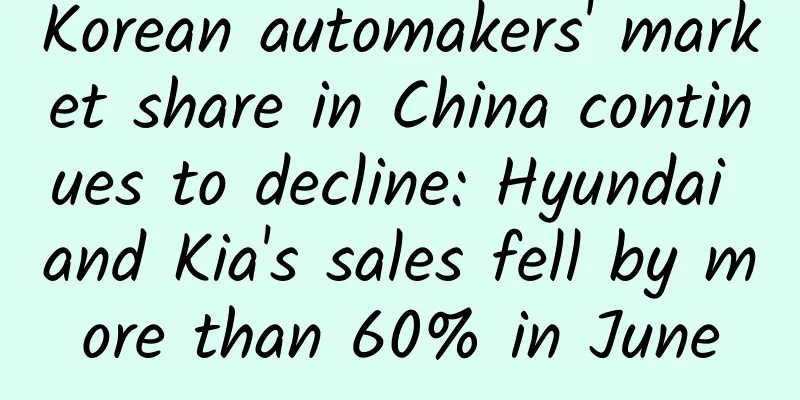Korean automakers' market share in China continues to decline: Hyundai and Kia's sales fell by more than 60% in June

|
The sluggish sales situation of Korean automakers in China has not improved. On July 3, Yonhap News Agency reported that South Korea's top five automakers sold 4 million vehicles worldwide in the first half of the year, down 8.1% year-on-year. Domestic sales and exported vehicles decreased by 4% and 9.1%, respectively. Korean cars are struggling in the Chinese market. Hyundai Motor and Kia Motors sold more than 35,000 and 17,000 vehicles in China in June, down 64% and 62% year-on-year. Yonhap News Agency attributed this to the impact of the THAAD incident. Independent automotive analyst Zhang Xiang told the reporter from The Paper that the THAAD incident was only a catalyst. The root cause was that Korean cars failed to grasp the rhythm of the Chinese auto market, which was a reflection of their declining product strength. Since the beginning of this year, the global sales of South Korea's top five automakers have been on a downward trend. According to data from the China Association of Automobile Manufacturers, from January to May this year, Korean brand passenger cars sold a total of 376,000 units, with a market share of only 4%, a rapid decline. During the same period, Chinese brand passenger cars sold 4.183 million units, a year-on-year increase of 4.11%, accounting for 44.4% of the total passenger car sales. Yonhap News Agency quoted a Hyundai Motor official as saying that Korean car brands' global sales performance was poor in the first half of the year due to factors such as decreased sales in China. According to the first quarter financial report of South Korea's Hyundai Kia Automotive Group this year, the global sales of the Hyundai brand were approximately 142.7 billion yuan, a year-on-year increase of 4.5%, but the profit was only 7.6 billion yuan, a year-on-year decrease of 6.8%. An unnamed Beijing Hyundai dealer told The Paper that in March and April this year, the number of customers entering the store and online sales leads were cut in half, and there were very few potential customers. In June this year, Wu Zhoutao, deputy general manager of Beijing Hyundai and deputy director of the sales department, said in an interview with Xinhuanet that the company had tried to carry out auto show promotion activities to help dealers attract traffic, but was rejected by the organizers on the grounds of safety. To alleviate the downward trend, Korean cars have begun to lower their prices in China. The Paper found from multiple online auto e-commerce sites that Hyundai's mainstream models are selling at discounts of 13% to 25% compared to their suggested retail prices; Kia models have seen price cuts as high as 35%. Zhang Xiang said that the problems Korean cars have encountered in the Chinese market are not a one-day problem. Korean cars, which started out with cost-effectiveness and good appearance, have missed the technical strategy of the Chinese market in recent years. He cited the example that in the field of intelligent networking and unmanned driving, Hyundai and Kia have not made many moves and introduced products slowly, which makes it difficult to see advantages compared with independent brands such as SAIC, Changan, and Geely. In the field of new energy, Beijing Hyundai's hybrid models are not as sold and technologically mature as joint ventures Toyota and Honda, and the technology route it has chosen, "hydrogen fuel cells", is still some time away from market promotion. In addition, Beijing Hyundai's product line coverage in the market segment is too dense, and its sales strategy of selling new and old models for four generations has also been criticized by the industry. There is no obvious difference between each model. Although it can achieve good sales feedback in a short period of time, it will further affect Beijing Hyundai's brand influence in the market segment. In addition to sluggish sales, Hyundai is also facing pressure from overcapacity. In the past few years, Hyundai has been expanding its production capacity in China. It is understood that Beijing Hyundai sold 1.14 million vehicles last year and its sales target for 2017 is 1.25 million vehicles. However, in the first five months of this year, the cumulative sales volume was 266,000 vehicles, accounting for only 21% of the annual sales forecast. In June this year, Xinhua News Agency quoted the views of Wu Zhoutao, deputy general manager of Beijing Hyundai and deputy director of the sales department, as saying that the sales expectations for this year will be adjusted in the near future. In the first five months of this year, Dongfeng Yueda Kia sold a total of 110,000 vehicles in China, only achieving 15.81% of the annual target of 700,000 vehicles. Cui Dongshu, chairman of the National Passenger Car Market Information Joint Conference, told The Paper that at present, automakers such as Beijing Hyundai and Dongfeng Yueda Kia are likely to face idle production capacity in their Chinese factories, which will affect corporate profits. Cui Dongshu believes that Korean car companies may adjust their global supply system, produce in China, and export products overseas to relieve pressure. There is also pressure from overseas markets. Previously, US President Trump publicly named South Korea's Hyundai Group and asked it to increase jobs in the United States. On June 30, Trump criticized South Korea's barriers to auto sales at a White House press conference. He compared South Korean auto companies with American auto companies, saying that South Korean auto companies have no difficulty selling cars in the United States, but American auto companies have a hard time selling cars in South Korea and have to work hard to gain a foothold. As a winner of Toutiao's Qingyun Plan and Baijiahao's Bai+ Plan, the 2019 Baidu Digital Author of the Year, the Baijiahao's Most Popular Author in the Technology Field, the 2019 Sogou Technology and Culture Author, and the 2021 Baijiahao Quarterly Influential Creator, he has won many awards, including the 2013 Sohu Best Industry Media Person, the 2015 China New Media Entrepreneurship Competition Beijing Third Place, the 2015 Guangmang Experience Award, the 2015 China New Media Entrepreneurship Competition Finals Third Place, and the 2018 Baidu Dynamic Annual Powerful Celebrity. |
Recommend
AlixPartners: China's global share of automobiles is expected to reach 1/3 by 2030
AlixPartners' latest report predicts that Chi...
Taking SEM advertising as an example, how data analysis can optimize promotion methods!
% ignore_pre_1 % Advertising guru John Wanamaker o...
2022 Mobile Photography Courses: A complete course on mobile photography, where even beginners can become mobile photography professionals
2022 Master the entire series of mobile phone imag...
The world's fifth person cured of AIDS has appeared. Can the method of conquering AIDS be replicated?
On February 20, 2023, researchers from the Univer...
What activities are there on Tmall’s 3.8 Queen’s Day in 2020? Tmall 3.8 Queen's Day discounts
March has arrived, which means that International...
Strategies for promoting events and attracting new customers!
This article should have been written in the firs...
Huizhou SEO training: scientific website promotion and optimization strategy
Now network optimization technology is more criti...
Meng Shengnan: The principle and method of alternative Baidu drop-down box
Baidu drop-down menu responsive keywords are the ...
WeChat Mini Programs to attract traffic and promote, how to promote WeChat Mini Programs to attract traffic?
It is becoming increasingly difficult to do physi...
China Association of Automobile Manufacturers: Brief analysis of passenger car production and sales in October 2022
According to statistics and analysis by the China...
Where the Heart “Sounds” – Exploring the Beautiful Sounds of the Heart
Author: Chen Bingwei, deputy chief physician of T...
Yan Jie 14-day extreme waist and abdomen shaping
Yan Jie's 14-day ultimate waist and abdomen s...
Musk warms up: Tesla Autopilot price will increase by $1,000 from November
Recently, Tesla CEO Elon Musk said on Twitter tha...
The "foreign restriction order" has been lifted, and the copyright fees of overseas dramas may be polarized
One quarter after the "foreign restriction o...
How to get the flu vaccine this year? All your questions are here
As the hot summer passes and the weather gets coo...









